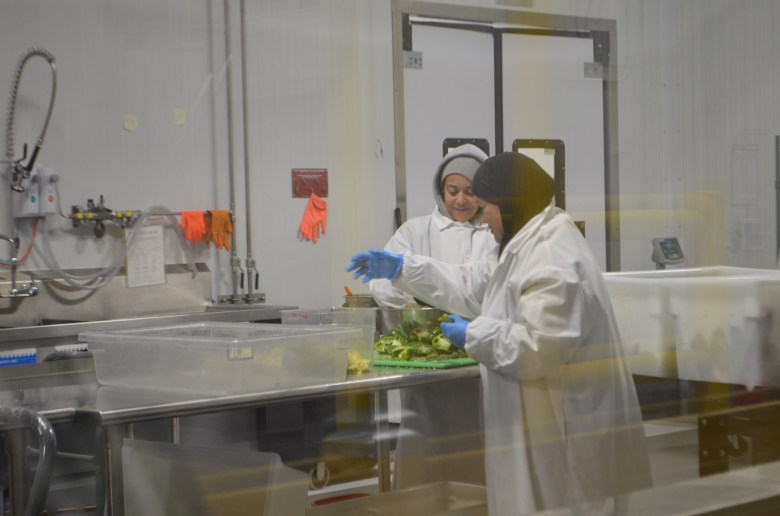ARCHER HEIGHTS — At his Austin home, Marvin Sykes, 57, takes a meal out of the fridge and pops it into the microwave.
Sometimes, he has fish; other times, it’s chicken paired with freshly made sides.
The meal is made about a dozen miles south at the Chicago’s Community Kitchens in Archer Heights, where chefs, dietitians and cooks at the Greater Chicago Food Depository’s prepared meals center prepare over 3,000 meals a day.
“I love them,” Sykes told Block Club in a phone interview. “The portion size is right and it’s got all the good foods you would normally not get.”
The nonprofit food bank, which provides produce and food items to area food pantries, opened the much-anticipated meal prep center in the spring. By now offering free, ready-to-eat meals, the organization can help more Chicagoans and Cook County residents in need of food assistance, leaders said.

The meal program helps people with disabilities, seniors, people with limited transportation and income and those living in food deserts. It also helps working families who lack the time or resources to make meals from scratch for their families every day, said Chief Operating Officer Jill Rahman.
This approach helps those facing food insecurity who cannot entirely rely on a pantry distributing free produce or food because they may lack time, access to a kitchen or accommodations for their needs, Rahman said.
The ready-to-eat meals make it “so simple,” said Sykes, who used to rely on canned soup or a neighbor or family member bringing him food. The meals also help him manage his diabetes, he said.

The meals are cooked from scratch in an industrial kitchen from a catalog of about 100 nutritious recipes that have been vetted by a registered dietitian and use few heavily processed ingredients.
The recipes center on the needs of seniors, people with medically tailored diets and people with disabilities.
“We have developed those recipes to be balanced for caloric content, hypertension and diabetes,” Rahman said.
Once meals are packaged, the Greater Chicago Food Depository delivers them daily to 40 food pantries, soup kitchens and community organizations. The fresh and frozen meals are then distributed to residents in 12 neighborhoods, primarily on the South and West Sides and in suburban Cook County.
“Older adults will get a hot, single-serve meal and they will also get some frozen meals so that they can eat on their own schedule,” Rahman said.
In February, the Greater Chicago Food Depository partnered with the Mayor’s Office for People with Disabilities to test out the meal delivery to residents primarily on the South Side and some on the West Side.
The program has been promising, and staff continue to learn to respond to the needs of meal recipients and those who could benefit from ready-to-eat meals, Rahman said.
It has also inspired innovation. Fresh herbs like parsley and cilantro are now grown in-house using hydroponics, a pilot project that has been successful and could be expanded, Rahman said.
The prepared meals center also creates job opportunities, reduces food waste and controls costs, Rahman said.

In another pilot program, the food bank has partnered with organizations to provide meals for workforce development program participants.
These approaches are a “comprehensive response” that can “keep people out of poverty and out of the line at the food pantry,” Rahman said.
“We know the cause of hunger is poverty, so we need people to have jobs. We’re not going to accept that someone needs to drop out of a program because of food insecurity,” she said.
The Greater Chicago Food Depository is able to make 10,000 meals a day. If demand goes up, it has the capacity to add a shift to make thousands more, Rahman said.
A 2019 report estimates there could be 100,000 more low-income seniors in Cook County by 2030, as the area’s population ages. The report, which surveyed people ages 65 and up, found those who have difficulty preparing meals on their own are more vulnerable to food insecurity, have poorer health and feel more lonely.
Demand at food pantries increased since the COVID-19 pandemic and remains high, Rahman said.
“What we didn’t anticipate is how bad inflation would be, so that has added to it,” Rahman said.
Listen to the Block Club Chicago podcast:

